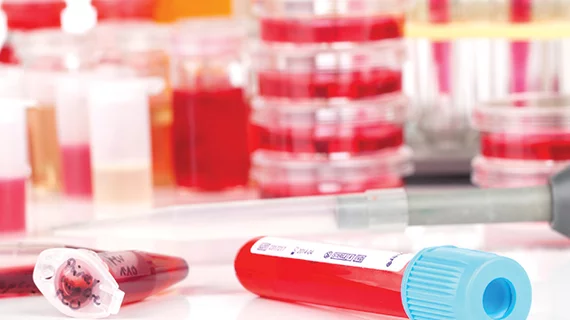Abbott’s troponin-I test helps predict CV events in patients without heart disease
Supplementing standard physicals with Abbott’s high-sensitivity troponin-I blood test could boost the accuracy of CVD prediction in middle-aged patients, according to research published in Circulation April 29.
In the work—the latest analysis of the Atherosclerosis Risk in Communities, or ARIC, study—corresponding author Christie M. Ballantyne, MD, and colleagues tested the efficacy of Abbott’s test in 8,121 ARIC patients, all of whom were between 54 and 73 years old and had no known heart disease at the time their blood was drawn in 1998. Ballantyne et al.’s study is one of 1,854 papers published by ARIC researchers since the project’s launch in 1987.
The authors said that since healthcare is shifting more from treating heart symptoms to preventing the onset of cardiovascular disease in its entirety, troponin tests like Abbott’s could hold significant value.
“Studies increasingly show the value of measuring troponin levels in people who have not been diagnosed with heart disease to help better determine their future risk,” Ballantyne said in a release. “This study supports the value of adding highly sensitive troponin-I blood tests to current cardiovascular risk assessments to better identify patients who might benefit from more intensive steps to improve their heart health like improved diet and exercise.”
Ballantyne and her co-authors used stored blood samples from their pool of ARIC participants to measure troponin-I levels using Abbott’s diagnostic test. Eighty-five percent of patients had detectable troponin and were tracked an average of 15 years for adverse CV events.
The researchers found patients whose troponin-I was deemed elevated by the Abbott test were more likely to experience cardiac episodes, including heart attacks, coronary heart disease, stroke, heart failure hospitalization and death. The increased risk was independent of risk factors like cholesterol levels, blood pressure, smoking status and diabetes.
Compared to adults with low troponin-I levels, adults with elevated levels saw more than twice the risk of a cardiac disease event, nearly three times the risk of ischemic stroke and more than four times the risk of hospitalization for heart failure.
“Advancements in our diagnostic technology are allowing us to see levels of troponin that may indicate early signs of injury to the heart years before heart disease becomes overt or symptoms appear,” Agim Beshiri, MD, senior medical director of global medical and scientific affairs at Abbott Diagnostics, said in the release. “Having a clearer picture of a patient’s heart health can serve as a wake-up call, empowering people to work with their doctors to take control of their heart health and possibly prevent a future cardiac event.”
Abbott’s high-sensitivity troponin-I blood test is available for cardiac risk assessment in CE-marked and non-regulated countries but isn’t yet commercially available in the U.S. The company said it’s actively pursuing registration in America.

